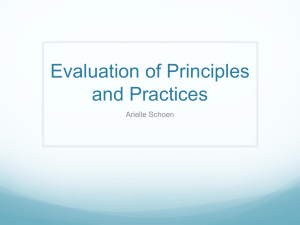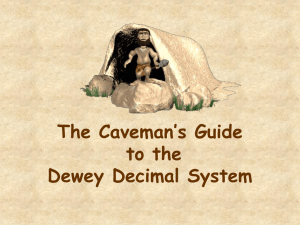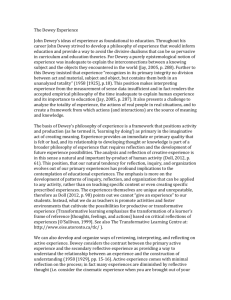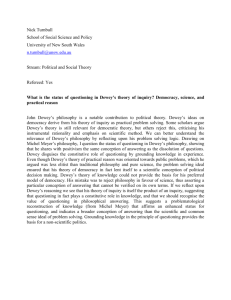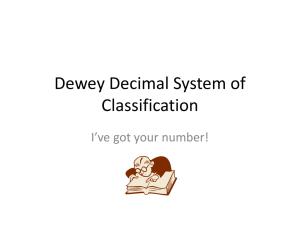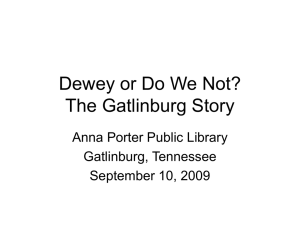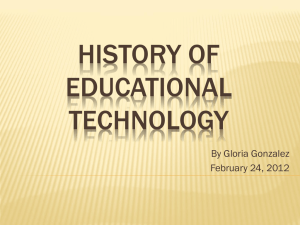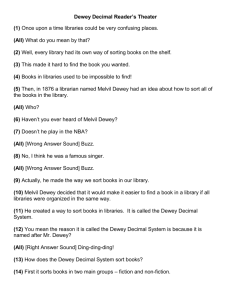Learning with or without a compass NERA paper 4 marts final
advertisement
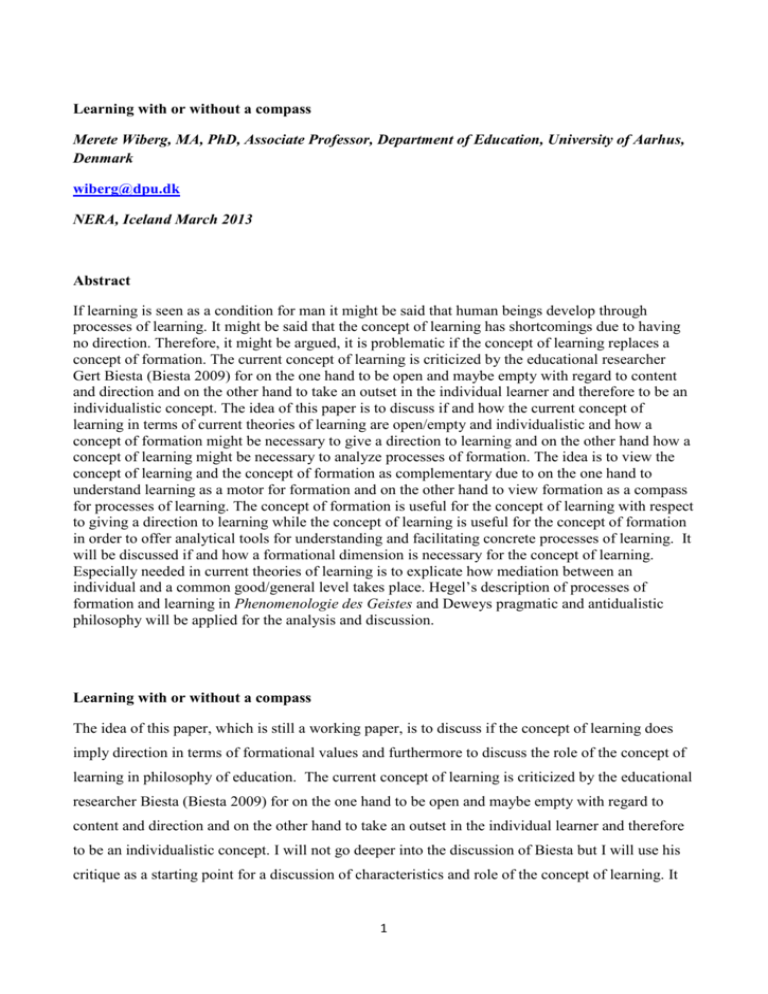
Learning with or without a compass Merete Wiberg, MA, PhD, Associate Professor, Department of Education, University of Aarhus, Denmark wiberg@dpu.dk NERA, Iceland March 2013 Abstract If learning is seen as a condition for man it might be said that human beings develop through processes of learning. It might be said that the concept of learning has shortcomings due to having no direction. Therefore, it might be argued, it is problematic if the concept of learning replaces a concept of formation. The current concept of learning is criticized by the educational researcher Gert Biesta (Biesta 2009) for on the one hand to be open and maybe empty with regard to content and direction and on the other hand to take an outset in the individual learner and therefore to be an individualistic concept. The idea of this paper is to discuss if and how the current concept of learning in terms of current theories of learning are open/empty and individualistic and how a concept of formation might be necessary to give a direction to learning and on the other hand how a concept of learning might be necessary to analyze processes of formation. The idea is to view the concept of learning and the concept of formation as complementary due to on the one hand to understand learning as a motor for formation and on the other hand to view formation as a compass for processes of learning. The concept of formation is useful for the concept of learning with respect to giving a direction to learning while the concept of learning is useful for the concept of formation in order to offer analytical tools for understanding and facilitating concrete processes of learning. It will be discussed if and how a formational dimension is necessary for the concept of learning. Especially needed in current theories of learning is to explicate how mediation between an individual and a common good/general level takes place. Hegel’s description of processes of formation and learning in Phenomenologie des Geistes and Deweys pragmatic and antidualistic philosophy will be applied for the analysis and discussion. Learning with or without a compass The idea of this paper, which is still a working paper, is to discuss if the concept of learning does imply direction in terms of formational values and furthermore to discuss the role of the concept of learning in philosophy of education. The current concept of learning is criticized by the educational researcher Biesta (Biesta 2009) for on the one hand to be open and maybe empty with regard to content and direction and on the other hand to take an outset in the individual learner and therefore to be an individualistic concept. I will not go deeper into the discussion of Biesta but I will use his critique as a starting point for a discussion of characteristics and role of the concept of learning. It 1 might be the wrong strategy to criticize the concept of learning for having no direction or content. An alternative is to try to understand the role of learning and how an analytical approach to learning might be helpful for the discourse of direction in education. A question is if it might be requested from a concept of learning that it has a direction or a compass in terms of formational values. Furthermore, it is necessary to discuss the idea of direction as a content of learning or as something which characterizes the concept of learning. Maybe it is a characteristic of the concept of learning that it has no direction in itself and therefore must be said to be without a compass? Maybe the concept has another role than giving direction to educational institutions and practice. Or maybe the idea of direction has another meaning and role when it comes to the concept of learning? What follows is a discussion of characteristics of the concept of learning compared to characteristics of concepts of education which have direction as a content such as the concept of formation/Bildung and the concept of worthwhileness in the liberal education tradition. Therefore, the aim of this paper is to discuss the role of the concept of learning, which is unfolded in current theories of learning, with respect to the idea of direction. Furthermore the aim is to discuss how educational concepts which are characterized by having a focus on direction, such as concepts of formation (Bildung) and worthwhileness (Peters 1972), on the one hand might be necessary to give a direction to learning and on the other hand, how a concept of learning might be necessary to analyze and guide processes of development and change. The idea is to view the concept of learning and educational concepts characterized by having a direction as complementary due to on the one hand to understand learning as a motor for inquiry, development and change and, on the other hand to be able to discuss direction in terms of a moral compass for processes of learning. The concept of learning will be viewed from a Deweyan perspective as being intertwined with a concept of inquiry. The concept of formation (Bildung) is rooted in a continental and Scandinavian tradition while the concept of worthwhileness has its roots in liberal education (Peters 1972). There are many differences between the Bildung tradition and liberal education tradition but it is a common characteristic that both traditions discuss values in education and how these values are to be implemented in education in order to give direction to educational institutions and educational practice. 2 Characteristics of the concept of learning. If the concept formation/’Bildung’ and the liberal education concept of education concerning what is worth-while (Peters 1972, p. 35) are compared with the concept of learning it is possible to find common characteristics. The concepts address development and change but they do it in different ways which are illustrated below. While the educational concepts from the tradition of formation and the tradition of liberal education concern normativity and ethical argumentation, the concept of learning appears as an analytical concept concerning the instrumental part of the process of development and change. The concept of formation (Bildung) and the idea of education as a striving for what is worth-while (liberal education) Normative approach, ethical argumentation, discussion of values in order to give direction to education. Characteristics of concepts: The concept of formation and the idea of worthwhileness have direction The concept of learning Method: Argumentation and development of concepts Method: Empirical approach and/or development of concepts. Possible strengths: Giving direction to processes of development and change. Possible strength: Analytical tool for explaining processes of development and change. Possible weaknesses: Difficulties in explaining processes of development and change Possible weaknesses: Having no tools for giving a direction to processes of development and change. Analytical approach: An idea of objectivity and neutrality. Investigation of what learning is and how learning goes on. Characteristic of the concept: The concept of learning has in itself no direction in terms of a moral compass. Aims of education: The concept of formation/’Bildung’: Focus on the mediation between the individual and the common good level Liberal education: Focus on the individual and the idea of autonomy.) Aims of education: To bring about learning, development and change but not in any specific direction. Maybe this picture is not exhaustive when it comes to the concept of learning. The problem might be that direction is only understood as a moral compass. 3 Firstly I will focus on the concept of learning and discuss why it is that learning maybe does not have a direction in terms of having a moral compass. A value such as effectiveness which very often is stressed in the discourse of learning might not be seen as a moral value but it is a value which to some sense give a direction to what a good life might be. On the other hand processes of learning are loaded with values but they might be seen as embedded in situations. It is a question where the ‘place’ is for direction in processes of learning. Where is direction to be found in concepts and theories of learning such as ‘communities of practice’ (Lave & Wenger), ‘processes of inquiry’ (Dewey), ‘processes of assimilation and accommodation’ (Piaget), ‘Zone of Proximal Development’ (Vygotsky), ‘change in meaning perspective’ (Mezirow) etc. It is not clear if direction is something found outside learning situations or if direction is to be found in learning situations in terms of being a property of a situation? If different concepts of learning which are unfolded in different theories of learning are to be identified in situations we might say that what we identify are ideas, such as for example ideas of transformation or participation. According to Dewey, ideas direct operations: “Ideas direct operation; the operations have a result in which ideas are no longer abstract, mere ideas, but where they qualify sensible objects. The road from a perceptible experience which is blind, obscure, fragmentary, meager in meaning, to objects of sense which are also objects which satisfy, reward and feed intelligence is through ideas that are experimental and operative.” (Dewey 1990, p.134). That is actions and situations are always to some sense directed due to ideas identified in situations. But what Dewey describes is not direction in terms of a moral compass but an identification of how ideas work in practice. To illustrate a situation which is characterized by having no direction I will quote Tolstoy who described situations in a sense which might be seen a literary counterpart to Dewey’s concept of the ‘situation’. The concept of the situation is central in the theory of Dewey and in order to analyze the concept of learning, the situation might be seen as an important analytical point of view due to Dewey’s understanding of learning as processes of inquiry which occur in doubtful or uncertain situations (Dewey 1997, p.148). The Tolstoy quotation is from War and Peace and describes the battlefield where marshals and generals try to direct the situation but fail in doing this. What happens is that soldiers are running back and forth trying themselves to get hold of the situation. 4 “The marshals and generals, who were nearer to the field of battle but, like Napoleon, did not take part in the actual fighting and only occasionally went within musket range, made their own arrangements without asking Napoleon and issued orders where and in what direction to fire, and where cavalry should gallop and infantry should run. But even their orders, like Napoleon’s were seldom carried out, and then but partially. For the most part things happened contrary to their orders. Soldiers ordered to advance ran back on meeting grape-shot; soldiers ordered to remain where they were, suddenly, seeing Russians unexpectedly before them, sometimes rushed back and sometimes forward, and the cavalry dashed without orders in pursuit of the flying Russians […] They did not fear getting into trouble for not fulfilling orders or for acting on their own initiative, for in battle what is at stake is what is dearest to man – his own life, and it sometimes seems that safety lies in running back, sometimes in running forward; and these men who were right in the heat of the battle, acted according to the mood of the moment.” (Tolstoy, L. 1974 p.520 The quotation from Tolstoy illustrates the problem of direction that even if directions are given – here as orders (not in terms of a moral compass) - it is not sure that anybody follows the direction. But still, the situation is loaded with ideas and values. Dewey understood humans as always being in situations which they strive to cope with by trying to analyze and view these situations as coherent wholes (Dewey 1991). ‘Coherent wholes’ , which I will come back to in the next section, might be seen from the perspective of the individual like the individual soldier in the quotation from Tolstoy, or from the perspective of a community which in the quotation from Tolstoy is represented by the army led by generals and marshals. The point of the quotation is that even if direction is decided before a situation is unfolded, here as war strategies, it is not always possible to know what will happen in a situation. Therefore, when aims for education are discussed it is important to be aware of that learning happens in situations where for example children and maybe the teacher as well, are running back and forth. Therefore it might be an idea to combine a concept of learning which has a micro perspective on the situation and a concept of formation/worthwhileness/moral compass which has a macro perspective on the direction of what is going on in situations at an institutional and societal level. 5 The concept of learning as inquiry and the idea of direction I will move on to Hegel’s dialectical philosophy and John Dewey’s pragmatic philosophy and point to the concept of inquiry as important to understand the concept of learning. Garison states that “...Dewey’s theory of inquiry doubles as a theory of learning” (Garrison 2006, p. 2). Furthermore Garrison points to how Dewey’s concept of inquiry is inspired by the Hegelian way of developing concepts: “Succesfully reconstruction novel situations and restoring unity through creative action requires creating novel concepts, hypotheses, and ends-in-view, which is how Dewey readjusted Hegel’s Begriff.” (Garrison 2006, p. 4). Dewey denied Hegel’s dialectical method but Hegel’s way of developing concepts by switching between identifying conflicts in what appears to be coherent wholes and to overcoming the conflicts by developing new concepts (Hegel 1973) might be seen as an inspiration for Dewey’s concept of inquiry. Dewey defined the concept of inquiry in the following way: “Inquiry is the controlled or directed transformation of an indeterminate situation into one that is so determinate in its constituent distinctions and relations as to convert the elements of the original situation into a unified whole.” (Dewey 1991, p. 108). If learning is understood as a kind of inquiry it starts to make sense why the concept of learning do not have a direction in terms of being directed by educational values such as autonomy, self-determination etc. On the other hand it might be said that to conduct an inquiry requires a kind of direction due to being a process which to some sense is ordered. If we are to answer the question: Does the concept of learning as a concept of inquiry has a direction? The answer must be that direction in a process of inquiry does not have direction in the same way as direction when it comes to the concept of formation in the tradition of Bildung or the concept of worthwhileness in the liberal education tradition. To understand learning as inquiry is to stress the role of the concept of learning as a motor in the process of development and change which happens in situations. To understand learning as a kind of motor, that is something which drives a process, gives the opportunity to not only criticize the concept of being without direction and content but instead to try to understand learning as a phenomenon which happens in situations. For example in the philosophy of Dewey, the idea of democracy is inherent in the concept of learning. 6 Conclusion The concept of learning has been criticized for being instrumental and to have only little to offer to education due to have no direction other than effective learning. I have in this paper tried to identify what might be the role of the concept of learning in education. My proposal is that the concept of learning might be useful to understand education in terms of situations. My preliminary conclusion is that theories of education on the one hand need concepts which give an opportunity to discuss direction in education while on the other hand theories of education need the concept of learning in order to understand situations in education. An example might illustrate this conclusion. In order to play music processes of learning and training are necessary in order to play the individual notes. On the other hand, it doesn’t make sense only to play a lot of notes if the musician is not able to give a direction in terms of a musical form by relating the individual notes to a meaningful whole. References. Biesta, G. (2009). Good Education in an age of measurement. Educational Assesment, Evaluation and Accountability 21 (1), pp.33-46) Dewey, J. (1997). Democracy and Education. New York :The Free Press. Dewey, J. (1990). The Quest for Certainty. John Dewey, The Later Works, Vol. 4. J. A. Boydston (ed.) Carbondale and Edwardsville: Southern Illinois University Press. Dewey, J. (1991). Inquiry, In: Boydston, A. (Ed.), John Dewey The Later Works, Volume 12, Carbondale and Edwardsville: Southern Illionois University Press. Dewey, J. (1989). Knowing and the Known, I: Boydston, A. (Ed.), John Dewey The Later Works, Volume 16, Carbondale and Edwardsville: Southern Illionois University Press Garrison, J. (2006). The “Permanent Deposit” and Hegelian Thoughts in Dewey’s theory of Inquiry, Educational Theory 56(1) Hegel, G. W. F. (1973). Phaenomenologie des Geistes, Frankfurt am Main: Suhrkamp Peters, R. S. (1972). Ethics and Education. London: George Allen & Unwin Ltd. Tolstoy, L. (1974). War and Peace (translated by Louise and Aylmer Maude) London: Oxford University Press 7
